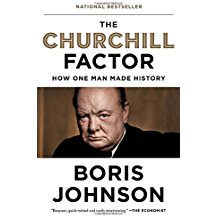The Churchill Factor: How One Man Made History, Boris Johnson, 2014
A truly fantastic book—informative, humorous, warm, and vivid. Johnson, the former MP and Mayor of London, writes a deservedly hagiographic biography of one of the 20th Century’s most formidable figures. Churchill, born in 1874 at Blenheim Palace (his cousin was the Duke of Marlborough), is described as the “best speaker, the best joke-maker, the bravest, the boldest, the most original, and…also the biggest policy wonk you ever saw”. Beginning effectively with the May 28, 1940 meeting of the War Cabinet where the question on the table was whether Britain should fight or settle with Hitler. France was about to capitulate; Poland, Belgium, Czechoslovakia, Austria had succumbed; Russia had signed the Ribbentrop Pact, and the BEF was on the beach at Dunkirk, beaten and about to be annihilated by the German Panzers. Halifax, Chamberlain, and others (“Stilton-eating, surrender monkey, arch appeasers’) argued for peace and a settlement with Hitler. Churchill held out and by his will and oratory carried the day. Through 1940 and 1941 Britain was the only hope for the Western World against the Third Reich, and Britain was effectively Churchill. Johnson goes on to summarize an extraordinary career—-65 years in Parliament, two periods of being the Prime Minister, a writer of 31 books and more words than Dickens and Shakespeare together, an innovative and inventive mind (the tank, the Iron Curtain, etc), an orator, and a ceaseless worker. From his days as a soldier in Cuba, South Africa, Africa, etc to his disastrous plans for Gallipoli, Churchill was always there, recovering from his failures (his ‘epic cock-ups’) and leading the efforts to maintain Britain’s empire, at one time ruling 450 million people in 50+ countries. Johnson also makes the persuasive case that Churchill was a Conservative Liberal, caring deeply about the working man and combining with Lloyd George after WWI to create the modern welfare state. All in all, a wonderful book about an extraordinary man summarized as follows: “He did possess a titanic ego, but one that was tempered by humour and irony, and by deep humanity and sympathy for other people, and by a commitment to public service and a belief in the democratic right of people to kick him out—as they did—at elections.”



